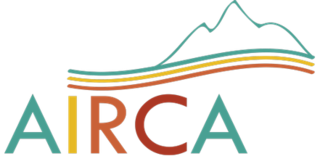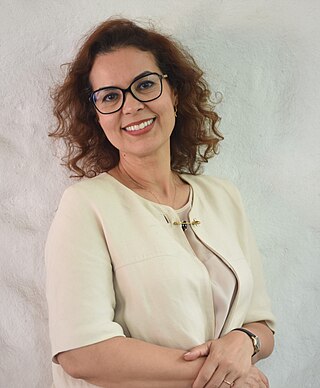
The Food and Agriculture Organization of the United Nations (FAO) is a specialized agency of the United Nations that leads international efforts to defeat hunger and improve nutrition and food security. Its Latin motto, fiat panis, translates to "let there be bread". It was founded on 16 October 1945.
The only mandated international agricultural research organization is the CGIAR The CGIAR Fund supports 15 international agricultural research centers such as the International Water Management Institute (IWMI), International Rice Research Institute (IRRI), the International Institute of Tropical Agriculture (IITA), the International Livestock Research Institute (ILRI), the International Food Policy Research Institute (IFPRI) and the Center for International Forestry Research that form the CGIAR Consortium of International Agricultural Research Centers and are located in various countries worldwide, The centers carry out research on various agricultural commodities, livestock, fish, water, forestry, policy and management.

CGIAR is a global partnership that unites international organizations engaged in research about food security. CGIAR research aims to reduce rural poverty, increase food security, improve human health and nutrition, and sustainable management of natural resources.

The Center for International Forestry Research (CIFOR) is a non-profit scientific research organization that conducts research on the use and management of forests with a focus on tropical forests in developing countries. CIFOR, which merged with World Agroforestry on Jan. 1, 2019, is the forestry and agroforestry research center of the Consultative Group on International Agricultural Research (CGIAR), a network of 15 research centers around the world that focus on agricultural research for sustainable development, working closely with governments and other partners to help develop evidence-based solutions to problems related to sustainable agriculture and natural resource management.

The Technical Centre for Agricultural and Rural Cooperation ACP-EU (CTA) was established in 1983 under the Lomé Convention between the African, Caribbean and Pacific Group of States and EU member states. Since 2000 CTA has operated within the framework of the ACP-EU Cotonou Agreement with a mission to “strengthen policy and institutional capacity development and information and communication management capacities of ACP agricultural and rural development organisations. It assists such organisations in formulating and implementing policies and programmes to reduce poverty, promote sustainable food security, preserve the natural resource base and thus contribute to building self-reliance in ACP rural and agricultural development.”. The centre is closed in 2020, after the end of the Cotonou Agreement and the subsequent end of its financing.

Plant Resources of Tropical Africa, known by its acronym PROTA, is a retired NGO and interdisciplinary documentation programme active between 2000 and 2013. PROTA produced a large database and various publications about Africa's useful plants.
Information and communication technology in agriculture, also known as e-agriculture, is a subset of agricultural technology focused on improved information and communication processes. More specifically, e-agriculture involves the conceptualization, design, development, evaluation and application of innovative ways to use information and communication technologies (ICTs) in the rural domain, with a primary focus on agriculture. ICT includes devices, networks, mobiles, services and applications; these range from innovative Internet-era technologies and sensors to other pre-existing aids such as fixed telephones, televisions, radios and satellites. Provisions of standards, norms, methodologies, and tools as well as development of individual and institutional capacities, and policy support are all key components of e-agriculture.
Rajendra Singh Paroda is an Indian agricultural scientist. He was the former Director General of the Indian Council of Agricultural Research (ICAR) and Secretary, Department of Agricultural Research and Education (DARE), Government of India. He was the general president of the Indian Science Congress Association during 2000-2001 and the president of National Academy of Agricultural Sciences (NAAS) from 1998 to 2000. He was elected as the first chairman of the Global Forum on Agricultural Research (GFAR), FAO, Rome from 1998 to 2001. He served as an executive secretary of the Asia Pacific Association of Agricultural Research Institutions (APAARI) based at FAO Regional Office, Bangkok since 1992. He also served as the chairman, board of trustees, ICRISAT, Hyderabad, member of IRRI Board, Los Banos, Philippines and was a member of Advisory Council of Australian Centre for International Agricultural Research (ACIAR), Canberra, and the Commonwealth Agriculture Bureau International (CABI), London.
The Global Forum on Agricultural Research and Innovation (GFAR) is an international forum that focuses on the future of agriculture and its role in development around the world.

Bioversity International is a global research-for-development organization that delivers scientific evidence, management practices and policy options to use and safeguard agricultural biodiversity to attain global food- and nutrition security, working with partners in low-income countries in different regions where agricultural biodiversity can contribute to improved nutrition, resilience, productivity and climate change adaptation. In 2019, Bioversity International joined with the International Center for Tropical Agriculture to "deliver research-based solutions that harness agricultural biodiversity and sustainably transform food systems to improve people's lives". Both institutions are members of the CGIAR, a global research partnership for a food-secure future.
The Regional Strategic Analysis and Knowledge Support System (ReSAKSS) was established in 2006 and compiles and analyzes information to help design and evaluate rural development strategies and monitor the progress of the Comprehensive Africa Agriculture Development Programme (CAADP). CAADP is a program of the African Union and the New Partnership for Africa's Development (NEPAD), which aims to increase the share of national budgets allocated to agriculture.

The Association of International Research and Development Centers for Agriculture (AIRCA) is an international, non-profit alliance focused on increasing food security by supporting smallholder agriculture and rural enterprise within healthy, sustainable and climate-smart landscapes.

Global Open Data for Agriculture and Nutrition (GODAN) is an initiative that seeks to "support global efforts to make agricultural and nutritionally relevant data available, accessible, and usable for unrestricted use worldwide. The initiative focuses on building high-level policy as well as public and private institutional support for open data."

The Global Landscapes Forum (GLF) is a multi-stakeholder forum that promotes the ‘landscape approach’. to building landscapes that are productive, prosperous, equitable and resilient. It works to catalyze a movement that puts communities first in informing and addressing landscape-level issues. The GLF’s network connects more than 10,500 organizations from 185 countries.
Between 2009 and 2012, Agriculture and Rural Development Day (ARDD) was an annual event co-organized by the Consultative Group on International Agricultural Research (CGIAR), the Earth System Science Partnership (ESSP), the Food and Agriculture Organization (FAO), the Global Forum on Agricultural Research (GFAR), the International Federation of Agricultural Producers (IFAP), and the International Food Policy Research Institute (IFPRI).

Ismahane Elouafi is the Executive Managing Director of CGIAR. Formerly Chief Scientist of the Food and Agriculture Organization of the United Nations (FAO), she is ranked among the 20 most influential women in science in the Islamic world and is internationally known for her work on promoting neglected and underutilized crops, use of non-fresh water in agriculture, and empowerment of women in science.

Smart Agriculture Competition is an annual greenhouse challenge and agricultural productivity competition launched by the largest agriculture technology platform Pinduoduo to encourage the use of data-driven tools to improve agricultural productivity and environmental sustainability.
The Pastoral and Environmental Network in the Horn of Africa (PENHA) is an international NGO founded in 1989 by professionals from the Horn of Africa to address pastoral and agro-pastoral development from a regional perspective and promote global cross-learning. Headquartered in London, PENHA has offices in Ethiopia and Somaliland and partnerships in Eritrea, Sudan, and Uganda.
EcoAgriculture Partners is an international non-profit Washington D.C.-based organization that develops and implements integrated landscape management strategies for sustainable agriculture, food security, livelihood improvement, climate change mitigation and adaptation and biodiversity conservation.
The Agriculture, Nutrition and Health (ANH) Academy is a global community of researchers, practitioners, and policymakers working on agriculture and food systems for improved nutrition and health. With over 9,000 members in over 145 countries, the organisation claims to have best researchers and other experts in the world.











